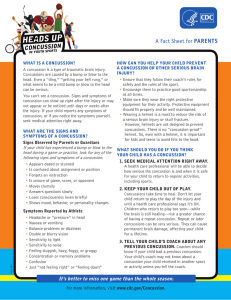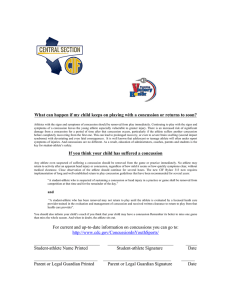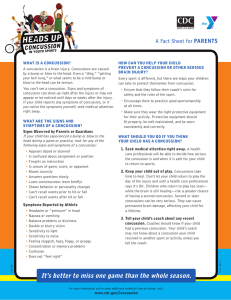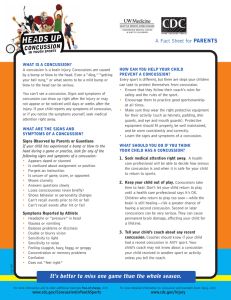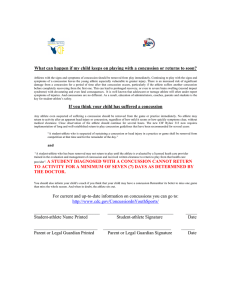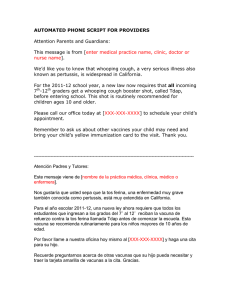M:0 - Montachusett Regional Vocational Technical School
Anuncio
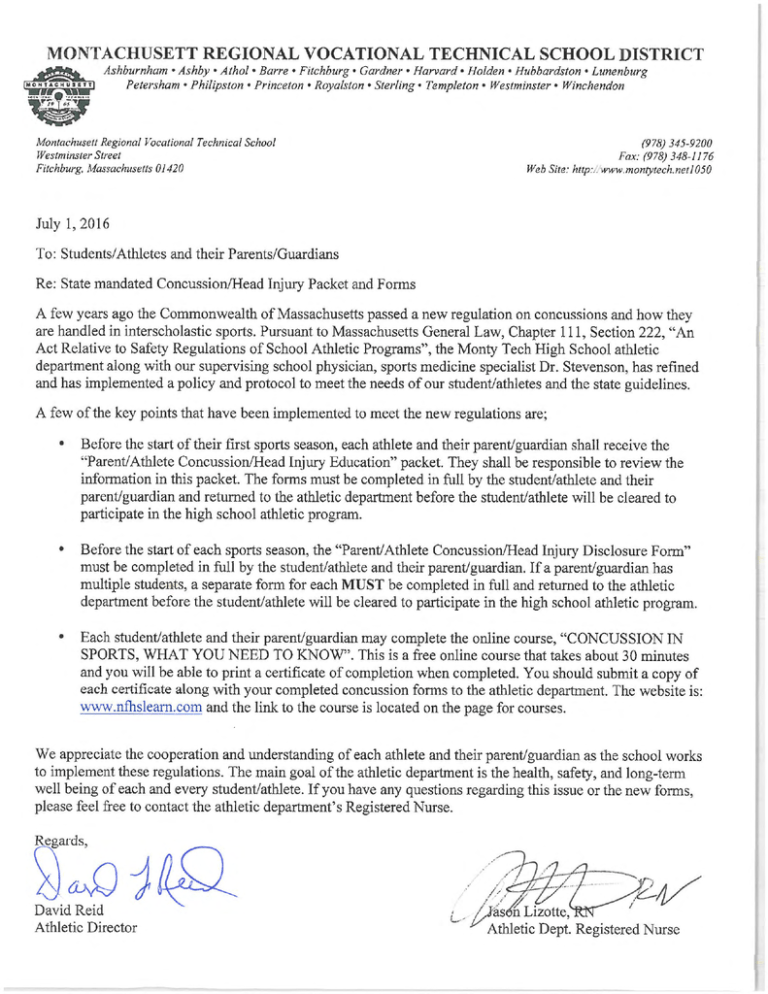
MONTACHUSETT REGIONAL VOCATIONAL TECHNICAL SCHOOL DISTRICT Ashburnham • Ashby •Athol• Barre •Fitchburg• Gardner• Harvard• Holden •Hubbardston• Lunenburg Petersham • Philipston •Princeton• Royalston • Sterling• Templeton• Westminster• Winchendon Montachusett Regional Vocational Technical School Westminster Street Fitchburg, Massachusetts 01420 (978) 345-9200 Fax: (978) 348-1176 Web Site: http:,. www.montytech.net/050 July 1, 2016 To: Students/Athletes and their Parents/Guardians Re: State mandated Concussion/Head Injury Packet and Forms A few years ago the Commonwealth of Massachusetts passed a new regulation on concussions and how they are handled in interscholastic sports. Pursuant to Massachusetts General Law, Chapter 111, Section 222, "An Act Relative to Safety Regulations of School Athletic Programs", the Monty Tech High School athletic department along with our supervising school physician, sports medicine specialist Dr. Stevenson, has refined and has implemented a policy and protocol to meet the needs of our student/athletes and the state guidelines. A few of the key points that have been implemented to meet the new regulations are; • Before the start of their first sports season, each athlete and their parent/guardian shall receive the "Parent/Athlete Concussion/Head Injury Education" packet. They shall be responsible to review the information in this packet. The forms must be completed in full by the student/athlete and their parent/guardian and returned to the athletic department before the student/athlete will be cleared to participate in the high school athletic program. • Before the start of each sports season, the "Parent/Athlete Concussion/Head Injury Disclosure Form" must be completed in full by the student/athlete and their parent/guardian. If a parent/guardian has multiple students, a separate form for each MUST be completed in full and returned to the athletic department before the student/athlete will be cleared to participate in the high school athletic program. • Each student/athlete and their parent/guardian may complete the online course, "CONCUSSION IN SPORTS, WHAT YOU NEED TO KNOW". This is a free online course that takes about 30 minutes and you will be able to print a certificate of completion when completed. You should submit a copy of each certificate along with your completed concussion forms to the athletic department. The website is: www.nfhslearn.com and the link to the course is located on the page for courses. We appreciate the cooperation and understanding of each athlete and their parent/guardian as the school works to implement these regulations. The main goal of the athletic department is the health, safety, and long-term well being of each and every student/athlete. If you have any questions regarding this issue or the new forms, please feel free to contact the athletic department's Registered Nurse. ~M :0 -;~ David Reid Athletic Director MONTACHUSETT REGIONAL VOCATIONAL TECHNICAL SCHOOL DISTRICT Ashburnham • Ashby • Athol • Barre • Fitchburg • Gardner • Harvard • Holden • Hubbardston • Lunenburg Petersham • Philipsron • Princeron • Royalston • Sterling • Templeton • Westminster• Winchendon Monrachuseu Regional r·ocarional Techn ical School Westminster Screer Fitchburg. Massachuse/ls 01-120 (978) 345-9200 Fax.· (978) 348-1176 Web Sire: hllp: iwww.montycech.net I 050 Parent/Athlete Concussion/Head Injury Education Form • Student athletes and their parents or guardians will also be educated on head injuries, concussions, and second impact syndrome prior to the start of each sports season by way of printed education materials from the Center for Disease Controls. • All athletes with a suspected concussion need to be seen immediately by the athletic department RN/EMT, EMT, or sports physician and triaged appropriately (monitoring the athlete, notifying parent or guardian, sending to ED, activating EMS, etc.) • Any athlete with a suspected concussion will be removed from participation for the day and will not be allowed to return until medically cleared by the students' primary care physician or the school physician. This includes game play, practice, as well as strength & conditioning exercises. • Any athlete who experiences a loss of consciousness will be removed from participation for the day and will not be allowed to return until medically cleared by the students' primary care physician and the school physician. This includes game play, practice, as well as strength & conditioning exercises. • No athlete with continued clinical symptoms will be allowed to return to play at any time • The school physician for Monty Tech High School has the final authorization for a students' return to play after a significant injury and or head injury/concussion. They will review the clearance from the primary care physician, the history of concussions, the signs and symptoms, and other related medical information. The athletic department RN/EMT, EMT shall also not accept return to play/practice from the students' physician if they think it is not in the best interest medically to the student until the school physician is consulted for approval and consult. • If a student athlete or parent/guardian believes that the student has a suspected concussion, they agree to report it immediately to their coach, covering medical staff, athletic director, or to seek medical attention if after school hours and the sports event has concluded. • More information on concussions and head injuries are to be posted on the Monty Tech athletic web page. • The National Federation of High School Sports offers a free online concussion education video program on their website. The video ''Concussion in Sports- What you need to know" It is located under the free course tab under courses at h!tp:1'.2Y~\\,\ ·!llh~l~fiJ!!.CQ)}'l • Additional materials and documents to download or view are available at the Centers for Disease Control and Preventions website at htJp: '_' W\\. v._.~q_c.,g~)~"l~oncu;;sion, ~p_oI1_s.(ipde;,,;J1tn;! U.S. DEPARTMENT O F H EALTH AND HUMAN SERVICES CENTERS FOR DISEASE CONTROL ANO PREVENTION A Fact Sheet for PARENTS WHAT IS A CONCUSSIO N? A concussion is a brain injury. Concussions are caused by a bump or blow to the head. Even a "ding," "getting your bell rung," or what seems to be a mild bump or blow to the head can be serious. You can't see a concussion. Signs and symptoms of concussion can show up right after the injury or may not appear or be noticed until days or weeks after t he injury. If your child reports any symptoms of concussion, or if you notice the symptoms yourself, seek medical attention right away. WHAT ARE THE SIGNS AND SYMPTOMS OF A CONCUSSION? HOW CAN YOU HELP YOUR CHILD PREVENT A CONCUSSION? Every sport is different, but t here are steps your children can take to protect t hemselves from concussion. Ensure that they fo llow their coach's rules for safety and the rules of the sport. Encourage them to practice good sportsmanship at al I times. Make sure they wear the right protective equipment for their activity (such as helmets, padding, shin guards, and eye and mouth guards). Protective equipment should fit properly, be well maintained, and be worn consistently and correctly. Learn the signs and symptoms of a concussion. Signs Observed by Parents or Guardians If your child has experienced a bump or blow to the head during a game or practice, look for any of the following signs and symptoms of a concussion: Appears dazed or stunned Is confused about assignment or position Forgets an instruction • Is unsure of game, score, or opponent • Moves clumsily • Answers questions slowly Loses consciousness (even briefly) Shows behavior or personality changes Can't recall events prior to hit or fall Can't recall events after hit or fal I Symptoms Reported by Athlete Headache or "pressure" in head Nausea or vomiting Balance problems or dizziness Double or blurry vision Sensitivity to light Sensitivity to noise Feeling sluggish, hazy, foggy, or groggy Concentration or memory problems Confusion Does not "feel ri ght" WHAT SHOULD YOU DO IF YOU THINK YOUR CHILD HAS A CONCUSSION? 1. Seek medical attention right away. A health care professional wil I be able to decide how serious the concussion is and when it is safe for your child to return to sports. 2. Keep your child out of play. Concussions take time to heal. Don't let your child return to play until a health care professional says it's 01<. Children who return to play too soon-while the brain is still healing-risk a greater chance of having a second concussion. Second or later concussions can be very serious. They can cause permanent brain damage, affecting your child for a lifetime. 3. Tell your child's coach about any recent concussion. Coaches should know if your child had a recent concussion in ANY sport. Your child's coach may not know about a concussion your child received in another sport or activity un less you tell the coach. DEPARTA.MENTO DE SALUD 'f SERVICIOS HuMANOS 0£ LOS ESTA.DOS UNIDO S CENTROS PARA EL CONTROL Y LA P R EVENC l 6N O E ENFERMEDA.DE S Hoja I nfo rm ativa para los PADRES Una conmocion cerebral es una lesion ~n el cerebra, causada ,COMO AYUDAR A SU HIJO A PREVENIR UNA CONMOCION CEREBRAL? por un golpe en la cabeza o una sacudida. Incluso una pequeiia Aunque todo deporte es diferente, hay medidas que puede tomar conmocion o lo que parece ser un golpe o sacudida leve puede para protegerse. ;.QUE ES LA CONMOCION CEREBRAL? ser serio. Haga que siga las reg las impartidas por el entr enador y las La conmocion cerebral no puede verse. Los signos y sintomas de lnvitel o a mantener el espiritu deportivo en todo momenta. reg las del depor te que practica. una conmocion pueden aparecer inmediatamente despues de la Haga que su hijo use el equipo protector adecuado segun la lesion o puede que no aparezcan, o se hagan visibles algunos dias actividad que realiza (como casco, almohadillas protectoras, o meses despues de haber sufrido la lesion. Si su hijo t iene los canilleras o protector dental). El equ ipo de protecci6n debe signos de una conmocion cerebral o si usted nota algun sfntorna, ajustarse bien, debe hacersele el mantenimiento adecuado, y busque atencion medica de inmediato. el jugador debe usarlo correctamente y en todo momenta. ;.CUALES SON LOS SIGNOS Y SiNTOMAS DE LA CONMOCION CEREBRAL? Signos que notan los padres y los tutores Si su hijo ha sufrido un golpe en la cabeza o una sacudida durante un juego o una prcictica, obseNelo para determinar si tiene alguno de los siguientes signos y sfntomas de una conmocicin cerebral: Luce aturdido o fuera de control Se confunde con la actividad asignada Olvida las jugadas No se muestra seguro del juego, la puntuaci6n ni de sus Aprenda a identificar los signos y sfntomas de la conmoci6n. ,QUE DEBE HACER SI CREE QUE SU HIJO HA SUFRIDO UNA CONMOCION CEREBRAL? 1. Busque atenci6n medica de inmediato. Un profesional de la salud podra determinar la seriedad de la conmoci6n cerebral que ha sufrido el niiio y cuando podra regresar al juego sin riesgo alguno. 2. No permita que su hijo siga jugando. Las conmociones cerebrales necesitan de un ciert o tiempo para curarse. No adversarios permita que su hijo regrese al juego hasta que un profesional Se mueve con torpeza Responde con lentitud Pierde el conocimiento (asi sea momentaneamente) regresan al juego antes de lo debido - mientras el cerebra Muestra cambios de conducta ode personalidad No puede recordar lo ocurrido antes de un lanzamiento sufrir otra conmoci6n. Las conmociones cerebrales siguientes o un caida No puede recordar lo ocurrido despues de un lanzamiento permanente que afectaran al niiio de por vida. o un caida Sintomas que reporta el atleta Dolor o "presion" en la cabeza Nauseas o vomitos Problemas de equilibria, mareo Vision doble o borrosa Sensibilidad a la luz y al ruido Se siente debil, confuso, aturdido o grogui Problemas de concentracion o memoria Confusion Nose "siente bien" de la salud le haya dicho que puede hacerlo. Los niiios que esta en proceso de curacion - corren un mayor riesgo de pueden ser muy serias. Pueden causar daiio cerebral 3. Informe al entrenador del nino sobre cualquier conmoci6n cerebral que el nino haya sufrido recientemente. Los entrenadores deben saber si el niiio ha sufrido una conmocion recientemente en CUALQU I ER deporte. EI entrenador no necesariamente sabra si el niiio ha tenido una conmoci6n en otro deporte o actividad a menos que usted se lo diga. U . S. DEPARTMENT OF HEALTH AND HUMAN SERVICES CENTERS FCR DISEASE CONTROL ANO PREVENTION A Fact Sheet for ATHLETES WHAT IS A CONCUSSION? A concussion is a brain injury that: · ls caused by a bump or blow to the head · Can change the way your brain normally works • Can occur during practices or games in any sport , Can happen even if you haven't been knocked out • Can be serious even if you've j ust been "dinged" WHAT ARE THE SYMPTOMS OF A CONCUSSION? • Headache or "pressure" in head ~ Nausea or vomiting , Balance problems or dizziness • Double or blu rry vision , Bothered by light ' Bothered by noise • Feeling sluggish, hazy, foggy, or groggy • Difficulty paying attention , Memory problems Confusion , Does not "feel right" Get a medical chec l< up. A doctor or health care professional can tel I you if you have a concussion and when you are 01< to return to play. , Give yourself time to get better. If you have had a concussion, your brain needs t ime to heal . While your brain is still heal ing, you are much more likely to have a second concussion. Second or later concuss ions can cause damage to your brain. It is important to rest until you get approval fro m a doctor or health care pr ofessional to return to play. HOW CAN I PREVENT A CONCUSSION? Every sport is different, but there are steps you can take to protect yourself. · Follow your coach's rules for safety and the rul es of the sport. Practice good sportsmanship at all t imes. • Use the proper sports equipment, including personal protective equipment (such as helmets, padd ing, shin g\Jard s, and eye and mouth guards) . In order for equipment to protect you, it must be : WHAT SHOULD I DO IF I THINK I HAVE A CONCUSSION? . Tell your coaches and your parents. Never ignore a bump or blow to the head even if you .., The rig ht equipment for the game, position, or activity Worn correctly and fit well Used every time you play feel fine. Also, tell your coach if one of your teammates might have a concussion. It's better to miss one game than the whole season. For rno•e 1rformation and to order additional materials free-of-charge visit: For more detailed information on concussion and traumatic brain inJuiy. visit: www.cdc.gov/Concussion In YouthSports www.cdc.gov/ concussion DEPARTA MENTO OE SAL..UD Y SERV I C I OS HUMANOS OE LOS ESTAOOS UNIOOS CENTROS PARA EL CONTROL Y LA PREVEii.,ct6N OE ENF E RMEOAOES Hoja Informativa para los ATLETAS ;.QUE ES LA CONMOCION CEREBRAL? sientas bien. Tambien dile al entrenador si crees que uno La conmoci6 n cerebral es una lesion del cerebra que: de tus compafieros de equipo sufrio una conmoci6n. Es causada por un golpe en la cabeza o una sacudida Puede cambiar el funcionamiento normal del cerebra Puede ocurrir en cualquier deporte durante las practicas Ve al medico para que te examine. Un medico u otro profesional de la salud podra decirte si sufriste una conmocion cerebral y cuando estaras Jisto para volver a jugar. de entrenamie nto o durante un juego Puede ocurrir aun cuando no se haya perdido el Tomate el tiempo suficiente para curarte. Si sufriste conocimiento una conmoci6n cerebral, tu cerebra necesitara tiempo Puede ser seria aun si se piensa que solo se trata de un para sanar. Es mas probable que sufras una segunda golpe leve conmocion mientras tu cerebra este en proceso de curac ion. Las segundas conmociones y cualquier ;.CUALES SON LOS SiNTOMAS DE LA CONMOCION CEREBRAL? conmocion adicional pueden causar dafios al cerebra. Por eso es importante que descanses hasta que un Dolor o "presi6n" en la cabeza medico u otro profesional de la salud te permitan Nauseas (sentir que quieres vomitarl regresar al campo de juego. Problemas de equilibria, rnareo ,COMO PUEDO PREVENIR UNA CONMOCIGN CEREBRAL? , Vision doble o borrosa , Molestia causada por la luz Aunque todo deporte es diferente, hay medidas que puedes Molestia causada por el ruido Sentirse debilitado, confuse, aturdido o grogui tomar para protegerte. Sigue las reglas de seguridad del entrenador y las reglas Dificultad para concentrarse del deporte que practicas. Problemas de memoria Manten el espfritu deportivo en todo memento. Confusion Utiliza los implementos deportivos adecuados, incluido • No "sentirse bien" el equipo de protecci6n personal (coma casco, ,GUE DEBO HACER SI CREO QUE HE SUFRIDO UNA CONMOCION CEREBRAL? Dile a tus entrenadores ya tus padres. Nunca ignores un go lpe en la cabeza o una sacudida aun cuando te almohadil las protectoras, can ii Ieras, gafas y protector dental l . Para que este equipo te proteja, debe: Ser adecuado para el deporte que practicas, tu posici6n en el juego y tipo de actividad Usarse correctamente y ajustarse bien a tu cuerpo Usarse en todo momenta durante el juego Es preferible perderse un juego que toda la temporada. Pa·a :::=·=· - . ·- · -aci6n o sot•c;tar mas materiales de forma gratuita visite: www.cdc.gov/ConcussioninYouthSports Para obtener · nformacion mas detallada sobre la conmocion cerebral 'f la lesion cereoral , raumatica, vis1te: www.cdc.gov/concussion MONTACHUSETT REGIONAL VOCATIONAL TECHNICAL SCHOOL DISTRICT Ashburnham • Ashby • Athol• Barre • Fitchburg• Gardner• Harvard• Holden • Hubbardston • Lunenburg Petersham• Philipston • Princeton • Royalston• Sterling • Templeton• Westminster• Winchendon Montachuseu Regional 1·ocaciona/ Technical School Westminster Scree, Fitchburg. Massachusetls () I ./20 (978) 3./5-920() Fax: (978) 3./8-1176 Web Site: hap: .'·www.montycech.net I ()50 Parent/Athlete Concussion/Head Injury Education Form Athlete/participant name (printed) YOG Sport *I attest that I have received, reviewed, and agree to follow the Parent/Athlete Concussion/Head Injury Education Form and the "Heads up Concussion in High School Sports, A fact sheet for athletes" and "Heads up: Preventing Concussion" both from the Centers of Disease Control and Prevention. If at any time I seek further information on this topic or clarification I will seek out the coach, school medical staff, or athletic director. Athlete/participant signature Date Parent/Guardian name (printed) *I attest that I have received, reviewed, and agree to follow the Parent/Athlete Concussion/Head Injury Education Form and the "Heads up Concussion in High School Sports, A fact sheet for parents" and "Heads up: Preventing Concussion" both from the Centers of Disease Control and Prevention. If at any time I see further information on this topic of clarification I will seek out the coach, school medical staff, or athletic director. If a parent/guardian wishes to speak with the supervising school physician about this topic and a possible concussion/head injury they shall inform the athletic director or medical coverage staff and arrangements will be made you to speak with them. Parent/Guardian signature Date MONTACHUSETT REGIONAL VOCATIONAL TECHNICAL SCH OOL DISTRICT ........ ......... Ashburnham •Ashby• Athol • Barre •Fitchburg• Gardner• Harvard• Holden• Hubbardston • Lunenburg Petersham • Philipston • Princeton • Royalston •Sterling • Templeton • Westminster • Winchendon ~ ~ Montachuseu Regional I ·ocational Technical School tn50 Westminster Streer Fitchburg, Massachusetts O1./20 (978) 3./5-92()(/ Fax: (978) 3-18-1176 Web Site: http: , ·www.montytech.net Parent/Athlete Concussion/Head Injury Disclosure Form Pursuant to Massachusetts General Law, Chapter 111 , Section 222, "An Act Relative to Safety Regulations of School Athletic Programs", participants of interscholastic athletic programs and their parents, prior to each season, must disclose any information relative to any head injury/concussion history . This information must be shared with the athlete's coach and a copy will be kept on file with the Athletic Director. Have you ever exhibited signs, symptoms, or behaviors consistent with a concussion/head injury (such as loss of consciousness, headache, dizziness, confusion, or balance problems) during a sporting competition or practice at any level? - - - YES - -- NO Have you ever been diagnosed with a concussion, possible concussion, or head injury by a medical professional? - - - YES - -- NO If you answered yes to either of the above questions. please list and explain each individual circumstance describing the signs and symptoms, treatments and the date of each incident. Sport_ __ _ _ _ _ _ _ __ _ Do you currently have, or ever you ever had athletic participation restrictions in relation to being diagnosed with a concussion? - -- YES - -- NO I attest that the above information is accurate to the best of my knowledge, MUST be signed by both student and parent/guardian. Parent/Guardian N ame (Print) Student/Athlete Name (Print) Parent/Guardian Signature Student/Athlete Signature Date Date
